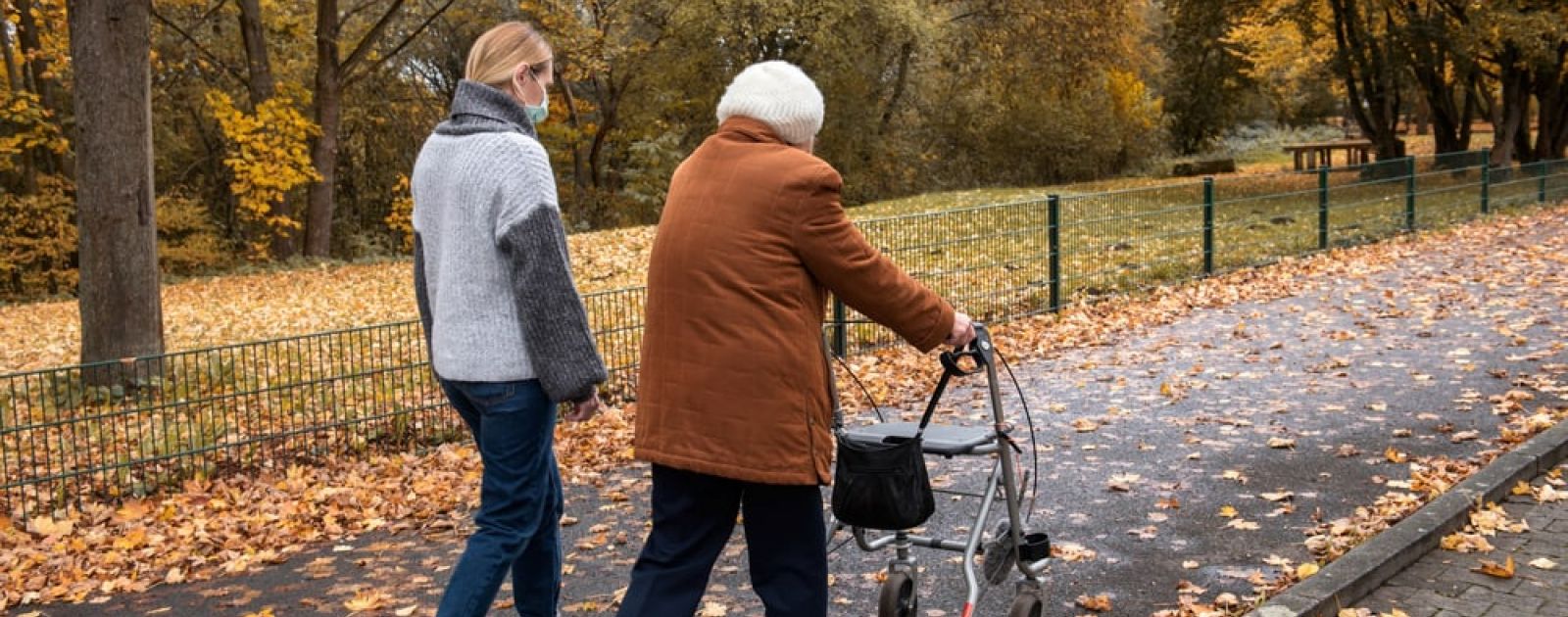
Preventing slips, trips, and falls in the elderly
Author: Christine Farmery
As the days get colder and darker, and the ground becomes more slippery, the risk of falling increases, particularly for older people. According to the NHS, around 1 in 3 adults over the age of 65 and half of people over 80 will have at least one fall a year.A little slip can have a big impact on both physical and mental health, knocking confidence as well as the body, but there are many things you can do to keep life in balance and prevent falls for you and your loved ones.
Ways to prevent falls for the elderly
With recovery time from falls increasing with age, prevention is better than cure, and there are many lifestyle changes that you or your loved ones can make to help prevent falls.
- Be active. According to Age UK, from the age of 55 we lose around 1% of our muscle mass every year, and that reduction in strength can make us more unsteady and less able to balance. Doing regular exercise is one of the best ways to stay well as you get older and its benefits extend across the whole of health, fall prevention included.
- Stay balanced with diet. Eating well and eating enough will help to keep energy levels up and help prevent unsteadiness.
- Keep hydrated. Not drinking enough water and becoming dehydrated can lead to feeling light-headed and unbalanced. The NHS recommends drinking at least 1.2 litres of water per day (six to eight glasses).
- Keep an eye on your eyes. Seeing clearly and peripherally is essential in fall prevention. Go for regular eye tests to identify any vision problems before they cause a fall.
- Listen out for hearing troubles. Hearing problems become more common in later life, and this can have a knock-on effect on your balance. Talk to your doctor or an ear specialist if you notice that you or a loved one are having difficulty in hearing.
- Monitor medication. Side-effects of medications can include dizziness and drowsiness. Contact your doctor if you think your medication may be causing you to feel faint or unbalanced.
- Look after your bones. Keeping your bones healthy will not only help with strength, it will also make them less likely to break if you do fall. Calcium-rich foods and plenty of vitamin D can help to build strong bones.
- Put your right foot forward. Looking after your feet with regular chiropody will help to keep your feet comfortable for walking. Wear comfortable and supportive shoes with good grip and fit when outside and always wear a well-fitting pair of slippers whilst indoors rather than walking in bare feet or socks.
- Take your time. Stand up slowly and ask for help if needed. If you’re with an elderly loved one, gently offer to help them with getting up and offer them an arm to hold to steady themselves when walking.
- Consider a walking stick. A physical or occupational therapist can help you decide if a walking stick or support may be helpful in keeping you steady.
Fall proofing the home
Many falls happen in the home, so making some small changes around the house can make a big difference to fall prevention.
- Remove trip hazards throughout the home like wires and clutter, especially on the floor and stairs.
- Secure carpets, rugs, and mats firmly to the floor with non-slip pads or tape.
- Make sure there is good lighting and plenty of switches throughout the home, especially where there are steps or stairs. Motion-activated lighting can be useful for night-time, or easy access to a light next to the bed so there is no need to get up in the dark.
- Add barriers and handrails where needed around the home such as near toilets, baths, and showers; and alongside stairs, steps, or uneven areas of the garden.
- Organise the home so that things are within easy reach and there is no need to climb, stretch, or bend to access day-to-day items.
- Consider a personal alarm to wear so that you are always able to call for help if you have a fall and can’t reach a telephone.
What to do if an older person has a fall
If you have a fall, try to stay calm and take a moment to assess if anything hurts and if you might have injured yourself. If you think you can get up safely without help, roll slowly onto your hands and knees, and crawl to a sturdy chair or bed to sit down. If you are injured, ask or call for help, use your personal alarm if you have one, or call 999. If you cannot reach help, try to stay as warm and comfortable as possible while you wait.
If you find someone who has had a fall, be careful not to move them quickly. If they are hurt, call an ambulance.
Once you have had a fall, you may feel worried about it happening again; it can prevent you from having the confidence to do certain activities and leave your home.
Talk to your family and your GP about any falls you have had and how they have affected you physically and mentally; there’s a great deal of help and support available for older people who have experienced falls.
Respite care, either at home or in a care home, can help after a fall, providing reassurance and support to rebuild skills, mobility, and confidence.
The Dower House
The Dower House is a nursing home in the Hampshire countryside near Winchester. We have been caring for older people and providing support to their families for over 30 years in an enjoyable and safe environment.
The Dower House provides full nursing respite care in one of the four short stay rooms. You can book a short stay for periods from four weeks, and we are often able to accommodate these stays at short notice.
Whether you’d like to book a visit to find out more about The Dower House, or you simply need to talk and get some advice about caring for yourself or your loved one, we’re ready to listen and happy to help. Please contact us on 01962 882848.
< Back to all Blog posts
Enjoy a taste of life at The Dower House
Join us for a tour of the house to experience the welcoming, homely atmosphere. Book a visit now, we’d be delighted to welcome you.
